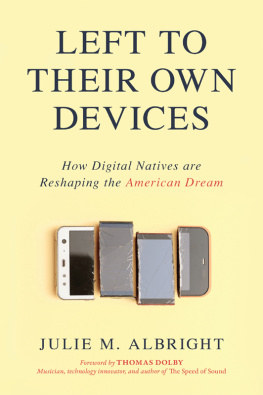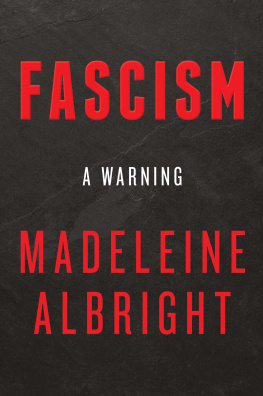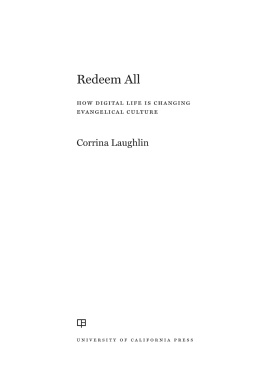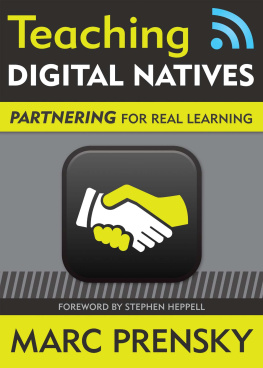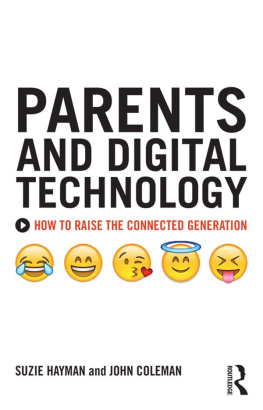
This book has been many years in the making. It was written across multiple cities, five countries and three continents. I first tested out the notion of coming untethered on an audience that organizer Bruce Armstrong Taylor described as a hard-bitten tech crowd in New York City in the winter of 2017. I wanted to see if the ideas resonated. A lively discussion followed my keynote; afterward, folks queued in a line for twenty-five minutes to speak to me. I noticed two tall men standing in that line, chatting among themselves. Looking back now, thinking about those two executives actually waiting over twenty minutes in a line to talk to me brings tears to my eyes. That day changed my life. My heartfelt thanks to you, Mr. Peter Gross and Mr. Christian Belady, for your continued support and encouragement. You have inspired me ever since I gave that talk on that snowy winter's day. Thanks, too, to George Rockett, Scott Foley, Giovanni Zappulo, Kurtis Friesen, Tom Winter, Maxine Chang, and the rest of the Data Center Dynamics conference team for your continued support.
Creating this work was certainly not an individual endeavor: I owe a great debt of gratitude to my wonderful agent, Mark Gottlieb of Trident Media Group in New York City, who believed in this project from the start. I'd like to thank also my editor at Prometheus Books, Steven L. Mitchell, for staying the course and for challenging me throughout. I know the work is stronger because of your efforts. Special thanks to you, Alexander Pournelle, for your feedback on early drafts. You lifted this project to a new level. Thanks, too, to the rest of the Prometheus team, including Lisa Michalski, Jill Maxick, Hanna Etu, Nicole Sommer-Lecht, Jade Zora Scibilia, and Cate Roberts-Abel for all your contributions.
This is a work of narrative nonfiction, inspired by artists, designers, composers, and writers then and now, from F. Scott Fitzgerald and R. W. Emerson to current writers Tod Goldberg, Jeff Eyres, Natashia Deon, and Lee Michael Cohn. Special thanks to David Ross and my spiritual guide, Mick Scott, for keeping me sane along the way.
My warmest thanks to Dean Nelson, Simon Allen and Jeff Omelchuck, Oliver Jones, Eddie Schutter, and Maricel Cerruti of Infrastructure Masons, for taking me into the fold and for all your support and good cheer.
I'd like to thank my colleagues at USCespecially Margaret McLaughlin, who believed in me from the start. You are a beautiful and graceful role model, and I wouldn't be here without you. Special thanks to my colleagues Don Paul, Edward Maby, James Moore, and Neil Siegel from the Viterbi School of Engineering. Thanks, too, to Stan Rosen, Dan Lynch, Brett Sheehan, Ed McCann, Oliver Mayer, Peter Exline, Clay Dube, Mina Chow, Erica Watson-Currie, and Victor Currie for your enduring friendship and support. Thank you, too, to Eddie North-Hager and Jim Key for your deft publicity support throughout the years.
I want to thank friends and other contributors to this project: First, Steven Meloan. You are the heart and soul of this project. You so graciously loaned me your parents, so we could retrace their steps toward the American Dream, your brother, Michael, providing us comic relief along the way. Your digital native son showed us where we are now. I'm glad we've been on this journey together. Thank you to Ryan Singer, Ed Maguire, Andy Grignon, Bill Tai, Alexis Dickerson, Alan W. Silberberg, Mr. and Mrs. Michael Daniel Williamson, Mr. and Mrs. Larry Singer, Ethan Anderson, Donavan Freberg, Brian Hayashi, Warren Whitlock, Lance Mayfield, Paul Boutin, Sarah Farley, Todd Terrazas, Woody Lewis, Barry Caplan, Ann Greenberg, Constanza Blondet, Ariel Jalali, Julio Fernandez, and Buzz Bruggeman for your contributions and inspiration. A heartfelt thanks to the artists and writers who took me in and inspired me while I worked on this project: Franklin Vagnone and Johnny Yeagley in New York City, and Jean-Luc Lienard and Noemie Le Menn in Paris. Thank you to Steven Moss and Gaynell Albright for your ongoing support and prayers. Robyn Mattison: You showed up in our lives at just the right time with your big heart, sharp wit, and guidance. Thank you, Dad, for all of the things you taught me about art, fashion, architecture, design, and New York. And for that Dave Brubeck album you left behind. Much of your spirit is woven into this project. I wish you were here to see it.
Lastly, and most importantthank you, my beloved brother, Brad. I am excited we can go on this journey together. Thank you for your unflagging support and enthusiasm. I appreciate you more than you'll ever know. We will never be untethered.

Americans forever imagine the lands further off are still better than those upon which they are already settled. If they attained Paradise, they would move on if they heard of a better place farther west.
Lord Dunmore, Royal Governor of Virginia, 1744
MAY 8, 1945. 10 DOWNING ANNEX, LONDON
Prime Minister Winston Churchill reached over and picked up the navy-blue leather-bound notebook he'd set down on the bedside table; he opened to the page he was working on when his secretary, John Miller Martin, interrupted him with the telegrams. He opened the one from Clementine, his wife first. Lady Churchill was in Moscow, having been dispatched there to deliver a burden of gratitude to the Soviets in the form of both aid and goodwill in her role as chairman of the Red Cross Aid to Russia Fund. Hearing of Germany's surrender, she cabled her husband immediately, saying, All my thoughts are with you on this supreme day, my Darling. It could not have happened without you.
After reading the telegrams, Churchill took his breakfast in bed: a poached egg, toast with butter and jam, cold chicken, milk, and grapefruit, followed by a whiskey soda and a cigar. He took a sip of his morning whiskey, lit the cigar with a big match, took a puff, then settled back to work. He often composed his speeches in bed, and today would be no different. He felt comfortable there and knew no one would bother him, save Mr. Martin, his private secretary. He found it easier to concentrate there than in the War Office with all its interruptions.
Churchill turned his attention back to the notebook and read the sentence again quietly to himself, This is your victory! The words, written in his usual rather-flat cursive style in black ink with his favorite fountain pen, were still damp on the page. He turned the first line of the speech over in his head. Churchill knew he had to strike just the right note: celebratory, yet somberthere was still far too much work to be done to repair the damage incurred during the Blitz of Hitler's Luftwaffe. Starting in September 1940, London was bombed for fifty-six days. More than a million homes were destroyed. Industrial centers, ports, and other strategic locations were targeted, as were civilians. Churchill had just rung off the telephone with Lord Woolton, the Minister of Food, whom he'd called to make sure there was enough beer in London for a proper celebration before he made the big announcement. The minister assured him there was. Churchill knew full well that his people would waste no time hoisting a pint to celebrate after six hard-fought, war-torn years. Both the rationing and the nightly blackouts had taken their toll on most Londoners morale. Churchill knew his people had grown war-weary and were ripe for celebration.
After scrawling out the final lines, Churchill got up and rang for his valet, Frank Sawyers, to come help him get ready for his public appearance. He then set off down the hall and descended the set of stairs that led to the basement War Room for the penultimate time. Technicians were already there shuffling about, checking the microphone for the official announcement, which had been set for 3:00 p.m. Churchill was late and a bit irritable; he shouted at the sound engineer, Pull down that blind! then blew his nose rather loudly, leaving the crowd of typists and private secretaries tittering in the hallway, their ears pressed to the Cabinet Room door to hear the announcement. At 3:40 p.m., Churchill finally leaned forward and began, My dear friends, he said, This is your hour The cheers outside could be heard all the way into the basement.
Next page
